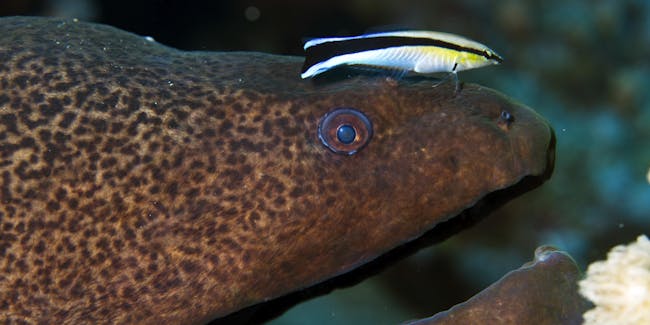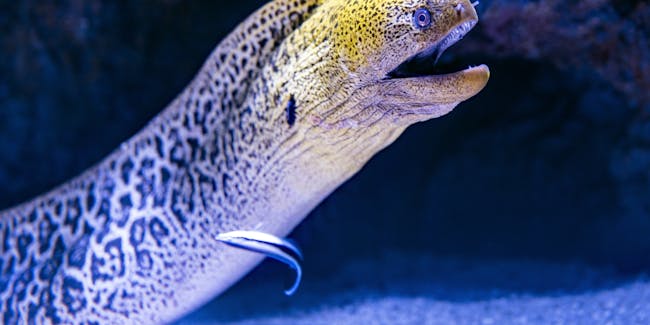Some scientists refuse to accept it.
By Peter Hess –
Controversial new research shows that a tiny, unsuspecting species of fish can pass a test that’s widely considered the gold standard of intelligence. As far as we can tell, only a few of the most intelligent non-human animals pass this mirror self-recognition test: great apes (gorillas, chimpanzees, bonobos, and orangutans), bottlenose dolphins, and Asian elephants, and a handful of others. In light of the unexpected new findings, some researchers are arguing it’s time for scientists to rethink how they test animal intelligence.
In a paper recently published in the journal PLOS Biology, an international team of researchers led by Masanori Kohda, Ph.D., a professor specializing in fish behavior at Osaka City University, outlines how the cleaner wrasse (Labroides dimidiatus) shows signs of self-recognition while looking in a mirror. In doing so, the fish, known for its ability to live off of the parasites it cleans off of other fish, appears to pass the test for “mirror self-recognition” — long considered a hallmark of self-awareness in animals.
Whether it means the cleaner wrasse is self-aware — or that this is a really bad test of self-awareness — is now up for debate.
When researchers uncovered mirrors in the fishes’ tanks, seven out of 10 of the fish in the study attacked it, meaning they probably viewed their reflections as rivals. But over the course of a week, they attacked the mirror less and less often and eventually stopped almost entirely. As this behavior died down, another took its place: The wrasses began swimming upside-down, which has never been observed before in either solo wrasses or groups. The fish, it seemed, were inspecting their reflections in a new way.
Things got even more interesting when the researchers put a mark on the fishes’ throats that they could only see in the mirror.
Rather than biting at the reflection, as a cleaner wrasse would when cleaning another fish (a move that would mean the fish failed the test), the fish appeared to try to scrape the mark off themselves by diving to the bottom of the tank and scraping their own throats on the aquarium pebbles. When the researchers used a transparent mark, or removed the mirror, the first didn’t seem to notice it, suggesting that seeing the mark in the mirror was the cue that led the fish to try to clean themselves.
The results have sparked controversy among the scientific community. Some researchers view the mirror test as an “all-or-nothing” measure that doesn’t account for subtle differences in animal cognition and behavior. Just because the fish look like they’re self-aware, they argue, doesn’t mean they have a clear sense of “self” in the same way that humans do.
“Complex cognitive capacities evolve bottom-up in small incremental steps from more basic traits shared across a wide range of species,” writes Frans de Waal, Ph.D., a professor of primate behavior at Emory University, in an accompanying editorial commissioned by PLOS to address the debate. “Therefore, we do not expect all-or-nothing cognitive differences between related species. Yet, for the capacity of self-awareness, we still live with a ‘Big Bang’ theory, according to which this trait appeared out of the blue in just a handful of species, whereas the vast majority lacks it.”
While the test may be an imperfect way to measure self-awareness, the results nonetheless indicate that cleaner wrasses, well known for being intelligent, are exhibiting some kind of behavior that merits further study.

The cleaner wrasse is so helpful that larger species let it be instead of eating it.
The study’s authors explain that the mirror self-recognition test involves three phases before the animal is marked in a place it can’t see without a mirror: “(i) social reactions towards the reflection, (ii) repeated idiosyncratic behaviours towards the mirror, and (iii) frequent observation of their reflection.” And as described in the paper, the fish engaged in all these behaviors.
What de Waal argues is that it’s not clear that the fish are really trying to clean themselves because of what they saw in the mirror. Perhaps they are just cleaning themselves reflexively after seeing what they think is another individual with a skin parasite. After all, the scraping behavior isn’t a new behavior.
“True, self-scraping is not a behavior one would expect if these fish interpret their reflection as another individual, but is this enough reason to conclude that they perceive the fish in the mirror as themselves?” he writes. “After all, the most compelling evidence for the latter would be unique behavior never seen without a mirror, whereas self-scraping, or glancing, is a fixed action pattern of many fish. We may need an in-depth study of this particular pattern before we can ascertain what it means when performed in front of a mirror.”
A major part of this problem is that the tests that can be performed on a fish are fairly limited. Unlike an elephant’s trunk or a chimpanzee’s fingers, the wrasse doesn’t have an appendage that it uses to explore its own body. Therefore, scientists can only infer why the fish is scraping the rock in the aquarium, whereas a chimp inspecting its body, for instance, is pretty clear sign that it understands it’s looking at itself in a mirror.
So is the cleaner wrasse as smart as a dolphin? For now, it’s hard to say. But it’s clear that scientists need to figure out a new way to assess animal intelligence.
(For the source of this article, and to watch a video relating to it, please visit: https://www.inverse.com/article/53117-is-a-cleaner-wrasse-self-aware/)










